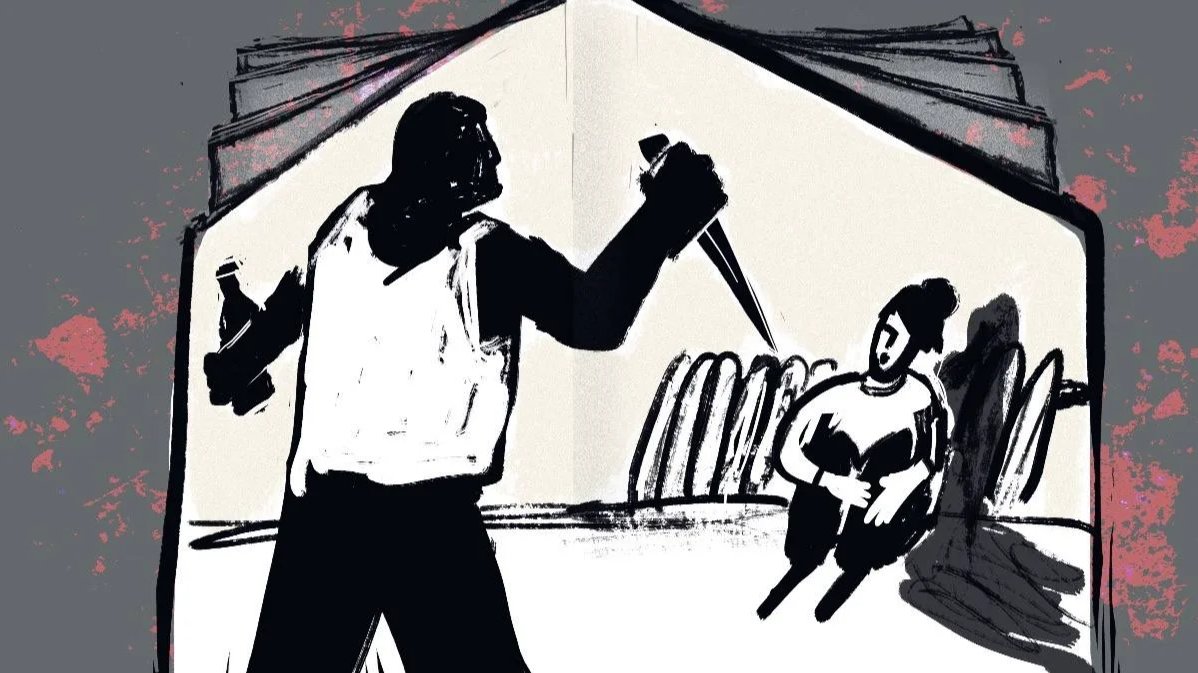In 2017, Russia’s parliament adopted a law that essentially decriminalised domestic violence. Under this law, if battery committed by a relative results in “minor” injuries, such as bruises, it is not considered a crime but rather a misdemeanour, punishable by only a small fine.
This article was originally published by Novaya Gazeta Kazakhstan.
The law was enacted after several conservative figures, including members of the Church and some Duma deputies, argued that the government should not intervene in family matters. They contended that if beating a relative were considered a crime, then all parents would be in prison for disciplining their children.
According to one estimate, between 2020 and 2021, 70% of all Russian women who were murdered died at the hands of their partners or relatives. But, lawmakers maintain that the population is sufficiently protected from domestic abuse.
Under existing laws, battery against a family member only qualifies as a crime if it is a repeated offence. It’s up to the victim to gather evidence, confront the abuser, and present their case in court.
In Russia’s judicial system, domestic abuse cases are not prosecuted by the state; a victim who wishes to hold their abuser accountable must rely on a private lawyer, which not everyone can afford.
Despite the intricacies of the Russian legal system that make it difficult to prosecute domestic violence, some incremental progress has been made by lawyers who take cases to the Constitutional Court: this court ensures that legislation complies with the constitution and determines whether a law has been applied correctly.
Rulings made by the Constitutional Court are key to getting law enforcement practices changed. The court can instruct other courts on how to treat future cases brought before them, and it can correct inconsistencies in past rulings.
The following stories all involve domestic abuse victims determined to challenge a system that often seems overwhelmingly skewed in the abuser’s favour.
Death threats
In 2019, the Supreme Court of Chuvashia, in Russia’s Volga region, sentenced Alexander Anufriev to 15 years in prison. Alexander had already confessed to killing his wife, Anna Ovchinnikova, whom investigators said was strangled with a clothesline.
A month before her death, Anna had told the police that her husband was threatening her life. Alexander had already served a fourteen-year sentence for killing two people in the late 1990s, and Anna took his threats seriously. But the police refused to open a criminal case against him, deciding instead that Anna was in no real danger.
After Alexander murdered his wife, he was convicted on several charges, but acquitted of making criminal death threats. This has to do with a loophole in Russian law, in which a criminal death threat is determined by the victim’s perception of its severity: the victim must perceive the threat to be “real”.
All of the courts who heard the case, including the Supreme Court, ruled that this charge could not be brought against Alexander, because the victim was no longer alive, and could no longer say how real the threat on her life felt. By killing his wife, Alexander had eliminated the only witness whose testimony could ensure his conviction.
Anna’s father, Nikolay Ovchinnikov, appealed to the Constitutional Court in an attempt to revise this verdict. The court denied the appeal, but it did revise the legal definition of a criminal death threat, which will help lawyers and courts eliminate the present legal loophole in the future. The court determined that the fact of Anna’s death served as evidence of a substantial threat, and when ruling, a court must consider circumstantial evidence, such as a victim’s appeals to the police.
“This ruling requires the state to better protect victims,” said Alexandra Klimanova (a pseudonym), who works with victims of domestic violence.

Photo: Anna Akeleva / Kommersant / Sipa USE / Vida Press
A legal reset
Lyudmila Sakova was beaten by her brother, Gennady Sakov, for several years. They lived in the same home in the Orenburg region, and she did not have the means to leave.
In 2018, with the help of a lawyer from the Centre for the Protection of Victims of Domestic Violence, Lyudmila brought legal action against her brother. The court fined Gennady 5,000 rubles (about €50), but this did not stop his assaults on Lyudmila and her child.
The following year, he was convicted on criminal charges, having “intentionally caused minor injuries” and “carrying out beatings” with a prior misdemeanour on his record. This merited more serious punishment: 100 hours of community service and a fine. But Gennady still didn’t stop.
After another attack, Lyudmila took a forensic medical exam to record her injuries. She had bruises on her face, abrasion marks, and partial hair loss. With this as evidence she went back to the police, but this time the court handled her complaint as a misdemeanour, not a criminal case. Gennady would face no criminal responsibility, because this new episode of violence had “reset” from the previous one.
“This case is a direct consequence of the decriminalisation of domestic assault,” Klimanova explained. “First he received a misdemeanour. For repeating this offence, he received a criminal punishment. But the third instance occurred outside of the statute of limitation for his original misdemeanour charge, so his charges reset. It is an absurd situation: a man who repeatedly commits domestic violence receives an insignificant, incommensurate punishment.”
Lyudmila filed an appeal to the Constitutional Court, and, in April 2021, it ordered lawmakers to amend the criminal code to better protect victims. That fall, legislators complied.
“After these amendments any case involving a repeated offender — someone who was previously charged with a violent crime — automatically warrants criminal punishment. In other words, it means tougher punishment for domestic violence,” Klimanova said.
Restraining orders
Olga Balukova and Yulia Chernigina share a common story: they are women who suffered harassment and assault at the hands of their former partners. When the legal system failed to protect them from their attackers, they both turned to the Constitutional Court.
After Balukova broke up with Artur Lagrandsky, he began to harass and threaten her. In December 2019, he followed Balukova to her place of work, where he beat and strangled her until she lost consciousness.
Chernigina’s story is similar. For months her ex-partner beat and harassed her. He showed up at her work, forced himself onto her, and terrorised her and her child.
In the summer of 2021, Lagrandsky was convicted for making criminal death threats and sentenced to one year of house arrest, but Balukova still felt unsafe. She requested that the courts place a restraining order on him, banning Lagrandsky from her home and work, but her request was denied.

Photo: Yury Kochetkov / EPA-EFE
First Balukova, then Chernigina, appealed to the Constitutional Court, which consolidated the women’s complaints. In January, the court ruled that domestic abusers could be restrained from visiting places where their victims regularly appear, such as their home or work.
During the investigation of Balukova’s case, Lagrandsky had been prohibited from visiting such places, following the Code of Criminal Procedure. But the code did not allow for a ban to be imposed as part of Lagrandsky’s sentencing. The Constitutional Court determined that if restraining orders were a demonstrably effective measure during criminal investigations, they could also be applied during sentencing.
“Any reasonable person understands that restrictive measures such as restraining orders are necessary in these situations,” Klimanova said. “Victims of domestic violence need to feel safe.”
Protect yourself
For years, Galina Baskakova was subjected to her ex-husband’s violence, and the process of bringing him to justice dragged on.
In 2019, her ex-husband was convicted of a misdemeanour and was fined. When Baskakova attempted to file a criminal charge against him, she turned to the police, who suggested she go to the court, and then she was refused by the court, which suggested she speak to law enforcement.
“This game of hot potato lasted for several years,” said Maria Nemova, the lawyer who helped Baskakova file an appeal with the Constitutional Court.
When the Constitutional Court weighed in, it ordered the regional court to respond to Baskakova’s requests, which Nemova viewed as only a partial victory.
The court had failed to address another procedural disadvantage to the victim: private prosecution. This legal feature means that, in domestic violence cases that charge criminal assault, victims are responsible for gathering and presenting evidence against their abusers themselves.
“All international standards tell us that private prosecution in domestic violence cases is a bad option,” Nemova said. “It is really difficult for the victim. To build a case you need a legal education.”
In a private prosecution, the plaintiff must attend every court hearing. If they miss one, the case is closed. Forcing a victim to repeatedly face their abuser and relive their trauma through testimony exacts an immense psychological toll.
“The Constitutional Court did not consider our argument that private prosecution in cases of domestic violence is a form of discrimination against women. It is an outdated position for the court to take, and I’d like to see Russia’s domestic violence legislation make the changes necessary to meet international standards,” Nemova said.
Join us in rebuilding Novaya Gazeta Europe
The Russian government has banned independent media. We were forced to leave our country in order to keep doing our job, telling our readers about what is going on Russia, Ukraine and Europe.
We will continue fighting against warfare and dictatorship. We believe that freedom of speech is the most efficient antidote against tyranny. Support us financially to help us fight for peace and freedom.
By clicking the Support button, you agree to the processing of your personal data.
To cancel a regular donation, please write to [email protected]

